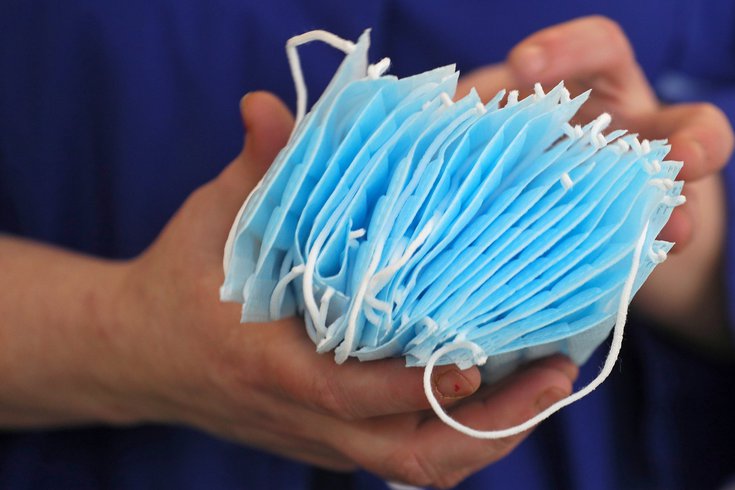
January 30, 2021
 Vladimir Smirnov/TASS/Sipa USA
Vladimir Smirnov/TASS/Sipa USA
Researchers are developing low-cost, wearable COVID-19 tests to detect community spread before an outbreak happens.
Stopping the spread of COVID-19 more quickly, before small outbreaks become larger ones, has been a challenge since the start of the pandemic. A new device could offer low-cost, daily testing to detect the presence of the coronavirus faster.
Researchers at the University of California San Diego are developing a color-changing COVID-19 detector that when attached to a face masks could be used to alert the mask's wearer about a possible infection.
The test strip detector sticks to the outside of a face mask, positioned opposite from the wearer's mouth, and gathers particles the person breathes out.
The strip has a blister pack filled with liquid containing color-changing nanoparticles. When mask wearer pops the blister pack, the nanoparticles would flood the test strip, which has been exposed to the particles from the wearer's breath.
The nanoparticles can detect the presence of coronavirus proteases that may have been breathed out and trapped in the mask, the UC San Diego researchers described in a recent article published on the college's website. The proteases are enzymes indicative of a coronavirus infection.
If they are found in the mask, the test strip changes color to show a positive test.
The goal isn’t to replace testing, but to give people an easy way to see if they potentially have COVID-19—especially those who are asymptomatic. Then you'd know that you need to get tested immediately & that you need to avoid other people in the meantime. https://t.co/JRrQayQOpv
— UCSD Engineering (@UCSDJacobs) January 29, 2021
The research team said they think the strips can become a daily test for facilities at high risk for community spread, such as homeless shelters, prisons, dialysis clinics and group homes.
"In many ways, masks are the perfect ‘wearable’ sensor for our current world," said Jesse Jokerst, a nanoengineering professor at UC San Diego's Jacobs School of Engineering. "We're taking what many people are already wearing and repurposing them, so we can quickly and easily identify new infections and protect vulnerable communities."
The test strips themselves can be placed on any type of mask. At the end of the day or when changing masks, a person would squeeze the blister pack on the test strip to determine if they they have COVID-19.
"Think of this as a surveillance approach, similar to having a smoke detector in your house," Jokerst said. "This would just sit in the background every day and if it gets triggered, then you know there's a problem and that's when you would look into it with more sophisticated testing."
The UC San Diego article also likened it to an at-home pregnancy test, saying it would not completely replace PCR tests, which have become the COVID-19 testing standard, but rather be and early indication that someone may be infected.
The project was funded through a $1.3 million grant from the National Institutes of Health to provide an affordable way to detect COVID-19.
The researchers say these strips could be mass produced at a low cost, and Jokerst said the goal is to make the test affordable enough for daily testing.
This type of test could be modified to detect other viruses, as well, Jokerst said.
Follow Hannah & PhillyVoice on Twitter: @hannah_kanik | @thePhillyVoice
Like us on Facebook: PhillyVoice
Add Hannah's RSS feed to your feed reader
Have a news tip? Let us know.